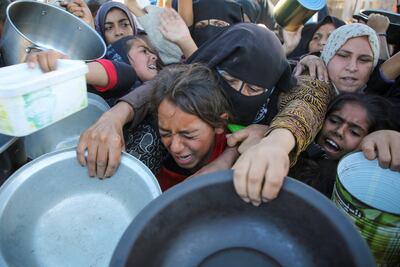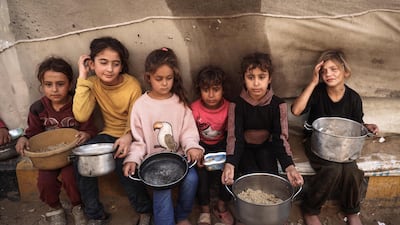Live updates: Follow the latest on Israel-Gaza
The rise of organised criminal gangs in Gaza has stemmed from the failure of Israeli forces to create a secure environment for distributing humanitarian assistance, depriving Palestinians of food and shelter that is instead being sold at high prices, the UN, local officials and residents told The National.
On Monday, the UN said a convoy was "violently looted" after entering Gaza, where 97 of 109 lorries were taken after drivers were "forced at gunpoint to unload the aid".
The UN agency for Palestinian refugees (UNRWA) said the convoy was given permission to pass through the Karam Abu Salem border crossing through an "unfamiliar route", with "no reason" given for this sudden change. The Israeli army did not immediately respond to The National's request for a comment.
UNRWA spokeswomen Louise Wateridge said the closure of the Rafah border crossing in May, and the "huge drop" in aid, has caused an increase in criminal activity in the past few months. "After 13 months of war and desperation, it is not a surprise that the situation is unfolding," she said.
"This is because of an environment that has been created where society has collapsed and there is very little in terms of law and order," she told The National from Al Nuseirat in central Gaza. The UN official accused Israeli authorities of "disregarding their legal obligations in creating a safe environment" and reinforcing "criminal activities and lawlessness".
Gaza government spokesman Taysir Muhaysin told The National that "dozens" of incidents had been recorded involving people guarding aid convoys being targeted. Mr Muhaysin said these groups of attackers operate with impunity within "proximity" to Israeli positions.
"They are never targeted. In contrast, anyone else who approaches these areas is immediately attacked," he said.
On Monday, Gaza's Ministry of Interior said it had killed 20 gang members during a "special operation" conducted in collaboration with local tribes as part of a broader campaign aimed at combating aid theft.

In a statement, Hamas praised the "deterrent efforts" made by the ministry against thieves who "tamper with the security of the home front and steal citizens' food, bread and medicine" and assist Israeli forces in "besieging our people and starving their children, women and elderly".
Selling aid
The UN cannot track the looted aid or be certain of what has become of it, but Ms Wateridge says it has since been "repurposed".
Witnesses have described seeing aid meant for free distribution being sold for much higher prices at markets. "People are begging for flour ... what little is available in the markets is sold for five times the price," she said.
Israel has stopped processing commercial imports since October 11, after they had been allowed for six months, through a system introduced by Cogat, the Israeli body that oversees aid and commercial shipments, a dozen merchants told Reuters last month diminishing the already small amounts of food available in markets.
displaced Gazan
In Gaza's southern area of Al Mawasi, displaced Moumen Al Shanabari, 51, said he sometimes waits months for assistance that, although is seen entering the strip, is not made available for ordinary people like him due to looting.
"We find aid in the markets. We are forced to buy it because thieves hijack entire truckloads and unload them in bulk. Without this theft, the crisis would still exist but would not be as severe."
Mr Shanabari called the looters "collaborators" with the Israeli forces. "They operate with the occupation's protection, with safe routes and armed interference against Gaza's security, allowing them to loot at will."
A "message" has been sent to merchants warning them against tampering with aid and exploiting the suffering of poor and displaced civilians, the Hamas statement said. Widespread food shortages, including flour, in the southern Gaza Strip have forced bakers like Fawzi Dabas to close down his shop because he could not afford to buy the vital ingredient at such exorbitant prices.
“I don’t have flour to run the bakery, and I don’t even have flour for my family. I’m buying bread at 3 ILS ($11) for two loaves, which used to cost only 1 ILS,” he told The National.
“There are thieves responsible for these high prices. Traders should refuse to buy flour from them to discourage such exploitation."
Even the flour available is not fit for consumption, he said: "It is filled with insects."
Ms Wateridge said aid workers have often remained at checkpoints for "seven hours" at a time, before being denied entry into Gaza.
"Everything is waiting to get in. There have been trucks lined up for six months waiting to get in. We have seen images all summer of humanitarian or commercial aid rotting and arriving rotten," she said.
Even merchants who are trying to make ends meet for their families say they have to sell items such as bread at higher than prewar prices due to the cost of raw material.
“The price of a sack of flour used to be 28 ILS before the war. Now it costs around 350 ILS, if you can even find it,” bread-seller Mohammed told The National.
Displaced Gazan Hanan Al Kasas, who lives in a tent in Khan Younis with 11 members of her family, says she has been searching for flour "for over a month" without success. “A sack of flour now costs nearly 400 ILS, which I can’t afford. We’ve stopped eating bread, but my children keep asking for it," she said. Instead, she has been relying on charity kitchens for meals.
“We want the war to stop so we can return to our normal lives. Even though life won’t be the same, we need to rebuild and move forward."









